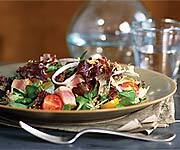Life Extension Magazine®
Osteoarthritis Symptoms Improved by Glycine | |
| Supplementing the diet with the amino acid glycine helps to prevent osteoarthritis, and could be used to treat physical injuries or other conditions related to structural weakness such as osteoporosis, a recent study has revealed.* Spanish researchers from Tenerife and Granada studied the effect of glycine supplementation in 600 subjects between the ages of 4 and 85 years with osteoarthritis, osteoporosis, or physical injuries. Participants were given 5 grams glycine in the morning and 5 grams in the evening. In all cases, symptoms significantly improved. Osteoarthritis or arthrosis is the most common osteoarticulary condition, which occurs when cartilage degenerates until bone is exposed, resulting in significant pain and impaired mobility. Although the disease is often treated with non-steroidal anti-inflammatory drugs, there is presently no cure. Although glycine is classified as a non-essential amino acid, meaning that it is not necessary to obtain by dietary means, the team’s research indicated that it should be considered essential as the body has limited capacity to synthesize glycine. They concluded that glycine leads to a general improvement in osteoarthritis and similar conditions over time, often between two weeks and four months. —Dayna Dye | |
| Reference | |
| * Available at: www.medicalnewstoday.com/articles/79021.php. Accessed August 10, 2007. | |
Broccoli and Cauliflower Reduce Aggressive Prostate Cancer Risk | |
A diet rich in cruciferous vegetables, particularly broccoli and cauliflower, may be associated with a lower risk of aggressive prostate cancer, a new study reports.* Previous research has shown that this family of vegetables, which also includes cabbage, kale, and Brussels sprouts, protects against colon, breast, prostate, thyroid, cervical, and other cancers, and slows disease progression. In this study, Canadian researchers analyzed dietary questionnaires from 29,361 men participating in the Prostate, Lung, Colorectal and Ovarian Cancer Screening Trial, including 1,338 men with prostate cancer, of whom 520 had aggressive disease. Evaluation of questionnaire responses after an average follow-up of 4.2 years revealed that a higher intake of broccoli and cauliflower had a particularly strong protective association against aggressive disease, which is associated with a poor prognosis. Men who ate more than one serving of broccoli a week had a 45% lower risk of aggressive disease compared with those whose intake was less than once a month. Cauliflower had an even greater benefit, with a 52% risk reduction in men who consumed the vegetable more than once a week. The researchers also noted a possible benefit in cancer risk reduction from consuming spinach. —Dayna Dye | |
| Reference | |
| * Kirsh VA, Peters U, Mayne ST, et al. Prospective study of fruit and vegetable intake and risk of prostate cancer. J Natl Cancer Inst. 2007 Aug 1;99(15):1200-9. | |
Low Testosterone May Signal High Metabolic Syndrome Risk | |
| Age-related decline in the male sex hormone, testosterone, may increase men’s risk for metabolic syndrome, a collection of risk factors strongly associated with diabetes and heart disease, according to a recent report.* Researchers in Taiwan studied nearly 400 men with an average age of about 79 years, looking for relationships between testosterone levels and indicators of metabolic syndrome. Low total testosterone levels were correlated with a high body mass index and elevated values for the following health parameters: body fat, blood sugar, insulin, glycosylated hemoglobin (HbA1c, a long-term indicator of high blood sugar), and high sensitivity C-reactive protein (a marker for ongoing inflammation). The researchers concluded: “Low total testosterone may be a significant indicator for development of metabolic syndrome in elderly men.” —Dale Kiefer | |
| Reference | |
| * Tang YJ, Lee WJ, Chen YT, Liu PH, Lee MC, Sheu WH. Serum testosterone level and related metabolic factors in men over 70 years old. J Endocrinol Invest. 2007 Jun;30(6):451-8. | |
Calorie Restriction and Glucose Control Workshop Changes Lives | |
| The Calorie Restriction Society presented “The Calorie Restriction and Glucose Control Workshop” at the Sheraton Tarrytown, New York, on August 10-12, 2007. The Workshop is now history, and it’s a history that will be built on. One historical aspect is that it was the first time that a workshop was held for the purpose of helping people practice and learn how to integrate Calorie Restriction (CR) into their lives. Many participants said that what they learned in those 2 ½ days would change their lives. The Workshop attracted people from around the world—Asia, Europe, and North America. And they came for all kinds of reasons—doctors were there for information to improve their patient care. Some LEF members came to learn more about Calorie Restriction to see if they wanted to try out this new longevity lifestyle. Other seasoned CR practitioners attended to find out how to take advantage of new research to guide their CR practices. All the participants were united in the goal of actively pursuing the best health. The media also had a strong presence—National Geographic attended all three days, and CBS sent a camera crew and reporter to film interviews and some of the scrumptious CR meals. Longevity and Cell SignalingThe Workshop introduced the concept that in 2007, CR is not so much about weight loss as about cell signaling. Paul McGlothin, vice president for research of the Calorie Restriction Society (www.calorierestriction.org), opened the Workshop by presenting the basics—how CR works and how to activate the cell signaling that makes CR a real longevity regimen, rather than just another diet. He presented the importance of insulin, the insulin-like growth factor (IGF-I) pathway, and the role of these hormones in aging and in calorie-restriction effects. Research ProjectThe workshop was held as a benefit for the Calorie Restriction Society’s research project, the only longitudinal study of CR in humans. Distinguished speakers presented results from the research so far as well as revealing future areas of study. Luigi Fontana, MD, PhD, the principal investigator of the project, presented background on the research, results so far,1-3 and the plans for future work, e.g. the forthcoming Phase 3 project, which includes testing the genetic effects of long-term CR in humans. In his presentation of lessons learned from the initial phases of the project, Dr. Fontana particularly cautioned about excessive intake of dietary protein—noting that protein stimulates high IGF-I concentrations, which increase tumor development at least in part by stimulating cell proliferation. In other research, Dr. Fontana revealed results from a recent study in which a group of individuals on a low-calorie, low-protein diet had lower plasma IGF-I concentrations than lean distance runners and a sedentary control group.4 Stephen R. Spindler, PhD, who will lead the genetic testing in Phase 3 of the research project, then went on to present the results of this project’s parallel studies in lab mice. The genetic results from the human subjects will be correlated to their clinical markers and compared with the mouse data, with the ultimate aim of developing easy-to-use clinical tools that will indicate how well the CR regimens are doing. Robert Krikorian, PhD, will lead a new aspect of the research in Phase 3—Personality and Cognition in Calorie Restriction—which will augment the clinical and genetic aspects of the study with measures of personality factors, mood, and working memory ability. Putting Calorie Restriction into Practice
A major part of the conference dealt with applying this new knowledge to everyday life—from food choices to exercise. Participants learned how to use blood glucose meters. In addition, they weighed their food at meal time and used NutriBase—the premier nutrition and fitness software—for an analysis of the calories and nutrients received from the diet. Other aspects of the Workshop showed participants how to integrate calorie restriction into a rich and rewarding holistic lifestyle that includes exercise, meditation, rejuvenating sleep, eating to enhance insulin production, and increase cognitive capabilities. The CR Way by Paul McGlothin and Meredith Averill—forthcoming from HarperCollins—covers all this and more (www.LivingTheCRWay.com). Benefits of Caloric RestrictionAn LEF member reading this might say, “What will I really gain if I try calorie restriction?” That question was resoundingly answered at the workshop:
Mark Your Calendar: Upcoming CR ConferenceTo learn more about CR, mark the dates November 7-11, 2007 in your calendar—this is when the Calorie Restriction Society will be holding its Fifth Conference in historic San Antonio at Sunset Station, (http://www.calorierestriction.org/conferences-2007), during which many famous Calorie Restriction scientists will present their perspectives on CR. Presenters include:
One of the most important aspects of the conference is the warm, friendly camaraderie. You can be sure that you will be warmly welcomed to CR 5. If you would like to have a Calorie Restriction and Glucose Control Workshop conducted for your organization or if you would like to partner with the creators to present a Workshop for additional audiences, please contact: BoardChair@CalorieRestriction.org or 800-929-6511. —Paul McGlothin and Meredith Averill | |
| Reference | |
| 1. Fontana L, Meyer TE, Klein S, Holloszy JO. Long-term calorie restriction is highly effective in reducing the risk for atherosclerosis in humans. Proc Natl Acad Sci U S A. 2004 Apr 27;101(17):6659-63. |










